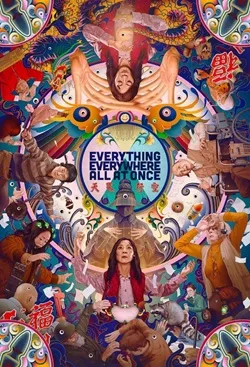
One of the beauties of Everything Everywhere All at Once is that anyone who watches the film will read their own experience into it. As I saw it, I witnessed my own experiences with the collapse of meaning and the desire for something greater, but there are many other readings–all of which are equally valid.
On the surface, the plot is fairly simple: Evelyn (Michelle Yeoh) and her husband Waymond (Ke Huy Quan) are Chinese immigrants to the United States, and they manage a laundromat together. Unfortunately, they’re being audited by the IRS, and are also trying to put on a party for the Chinese New Year, something especially important as Evelyn’s father (James Hong) is visiting from China. Evelyn also has challenges with her daughter, Joy (Stephanie Hsu), who is a lesbian.
These different elements make for a compelling drama, but the film becomes strange when–as Evelyn is waiting in the elevator at the IRS office–she learns that there is a threat to the “multiverse,” and only she can stop it.
It turns out that the ultimate thread is Jobu Tupaki, the multiversal version of Joy, who experiences everything at the same time. However, having seen and witnessed everything, she is utterly nihilistic and comes to believe that nothing matters.
Only Evelyn is able to push back against her daughter’s nihilism, thanks to the positive influence of her husband, Waymond, who embodies the existentialist hero in his greatest form: it’s true that nothing matters objectively, but that doesn’t mean we can’t create our own meaning, especially in a universe where everything is possible.
The film takes seriously the Many-Worlds interpretation of quantum mechanics, as do many other forms of superhero media (think, for example, of Loki or the Spider-Verse franchise). It’s worth noting that we don’t really know if this interpretation is the correct one, and most physcists remain covinced by the Copenhagen interpretation. Even so, it is worth asking: What would it mean for us if it is true?
There are also resonances here with Ted Chiang’s story, “Anxiety is the Dizziness of Freedom” (in Exhalation): we become who we are not by some force of destiny, but because of each little decision we make. Over time, these decisions leave a massive impact.
There’s also a great deal to be said about the film’s way of depicting life with ADHD (something that I know well) and generational trauma, but others can speak to that far better than I can.